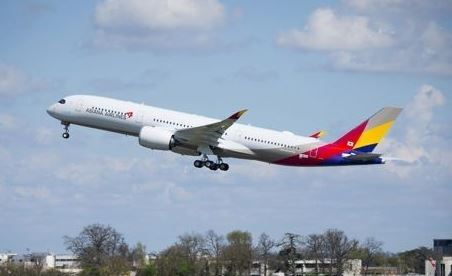Aekyung, a South Korean activist fund and a consortium led by a local brokerage firm submitted initial bids to acquire Asiana Airlines Inc., South Korea's second largest full-service carrier, industry sources said Tuesday.
Kumho Asiana Group, the airline's parent, and its lead manager for the sale, Credit Suisse, received letters of intent from potential investors, including Aekyung and local activist fund Korea Corporate Governance Improvement, according to sources.
 |
Asiana Airlines (Yonhap) |
The consortium led by Mirae Asset Daewoo Co., a major brokerage house here, also joined the bidding, they said.
Kumho Asiana aims to sell a 31-percent stake in Asiana held by its subsidiary, Kumho Industrial Co., together with its two budget carrier units -- Air Seoul Inc., which is wholly owned by the airline, and 46 percent owned Air Busan Co. -- as part of its broad restructuring efforts.
Analysts estimate the deal could be worth up to around 2 trillion won ($1.6 billion) when a management premium is considered.
Aekyung, which owns the nation's largest budget carrier, Jeju Air Co., and KGCI fund is the second largest shareholder with a 16-percent stake in Hanjin KAL, the parent company of Korean Air Lines Co.
Major conglomerates, such as SK, CJ, and Hanwha, have been widely mentioned as potential buyers for Asiana, but they said they did not submit their respective bids for Asiana.
Kumho Asiana plans to complete the sale of the airline unit within this year. The South Korean transportation conglomerate is expected to shortlist the bidders this month before due diligence.
It is expected receive final binding bids no later than November.
In 2018, Asiana Airlines and its main creditor, the state-run Korea Development Bank, signed a deal that required the carrier to secure liquidity through sales of assets and other means.
In the January-June period, the airline's net losses widened to 292 billion won from 43 billion won a year earlier due to the won's weakness against the dollar. A weak won drives up not only the value of dollar-denominated debts when converted into the local currency but also fuel purchasing costs.
It owes financial institutions a total of 2.7 trillion won in short-term obligations, with 660 billion won of loans maturing this year. (Yonhap)








